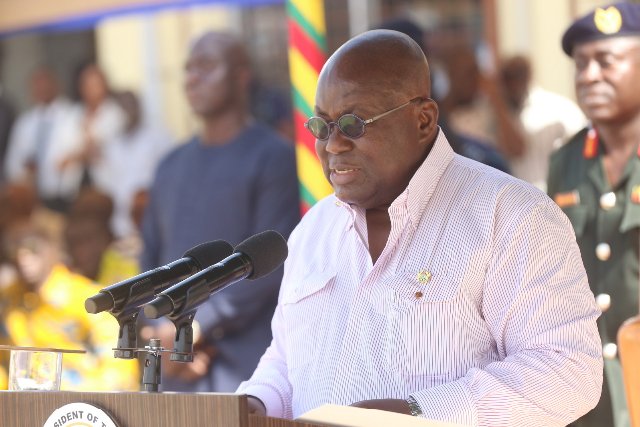President Akufo-Addo, on April 23 2018, commissioned the refurbished Sekondi Fishing Harbour, at a ceremony in Sekondi, in the Western Region.
According to President Akufo-Addo, “the completion of this harbour is critical, because the fishing industry is an important mainstay not only of many of the residents of Sekondi, but also of some two million Ghanaians across the country.â€
The refurbishment of the Harbour, which was began by the Mahama administration in July 2016, and now completed by the Akufo-Addo government, the President said, “is evidence of the pledge I made in the run-up to the 2016 general elections that I will not abandon any project merely because it was started by a previous government.â€
Whilst extending sincere appreciation to the Government and people of Japan, who, through the Japan International Cooperation Agency (JICA), are responsible for the technical and financial support given to this project, President Akufo-Addo underscored the importance of the fishing industry to Ghanaians.
With the first rehabilitation of the Sekondi Harbour taking place in 2005 under the Kufuor-led NPP government, with its attendant boost to the fishing industry, the President stated that this current refurbishment, which cost some US$20 million, has equipped the harbour with a lay-by wharf, access road to boats, a fish market shed, fuel dumps, an administration block, a fresh water storage tank and a state-of-the-art ice-making machine.
The ice-making machine has the capacity to produce some 30 tons of ice per day to preserve the catch, as against the previous capacity of 15 tons of ice per day, with the President expecting a substantial rise in the activities of our fisherfolk and traders in Sekondi, and in surrounding communities, following the completion of the Harbour.
President Akufo-Addo, thus, charged Ghana Ports and Harbours Authority (GPHA), responsible for supervision of the Harbour, to take good care of it, in order to protect the US$20million investment for current and future generations.
President Akufo-Addo also used the opportunity to reiterate the unwavering commitment of Government to protect the territorial integrity of our country, in the face of the activities of pirates in the Gulf of Guinea.
“We will not allow pirates or criminals to rob us of this hard-won reputation, and create a sense of insecurity on our waters. To the fourteen tuna fishing companies that are reported to have recently halted operations due to the menace posed by the pirates, I urge them to resume. They have the full assurance of Government of their protection and safety, as they go about their day-to-day activities. We will not leave them to fight this menace alone. The full force of the state’s security apparatus is being marshalled to curb the threats of piracy,†the President said.
 President Akufo-Addo also revealed that plans are underway for the construction of mini-fishing harbours and landing sites across the coastal belt of the country.
Already, Government has signed an agreement with the Chinese Government for the establishment of the Jamestown fishing port complex, at a cost of US$50 million, with construction scheduled to commence this year.
“Under the Fisheries Sector Infrastructural Development Programme, the Ministry of Fisheries will commence the development of three landing sites at Winneba, Mumford and Axim; rehabilitate three public hatcheries at Vea, Sankana and Dormaa-Ahenkro; rehabilitate three fish health laboratories at Takoradi, Koforidua and Kumasi; complete and commission the Anomabo Fisheries College; and refurbish the Tema Boat Yard to increase productivity of fisher folk,†he added.
As Co-chair of the Group of Advocates of Eminent Persons of the United Nations Sustainable Development Goals, President Akufo-Addo concluded by stressing that “even though we may have little or no control over climate fluctuations or changes, one thing we can have control over is our day-to-day activities.â€
primenewsghana.com/general-news.html





